Monday, November 22, 2010
No man, yuh kyann manage dat. (Yes I can!)
I have had a great many humbling experiences in Peace Corps so far. Not only have I been training to block out distractions my whole life, I've also gotten used to living on my own for the past five years. Now I'm going from cooking for one to cooking for 11. The pot is a lot harder to stir! Turning on a sink is a lot easier than pouring water from a large basin. I'm really fast at working on computers and with spreadsheets, but I'm pretty slow at hand washing. I can open a can easily with a can opener, but the school doesn't have one. It turns out I'm pretty clumsy with a knife. Probably the number one skill that Peace Corps Volunteers should have is skill with a knife. Other skills that would come in handy are construction, farming/machete weilding, and carrying things on your head. In any case, I'm lousy at all these pratical skills. I never realized that I lived such a stoosh life. All of these changes coupled with the stereotype that white people are weak result in me hearing "No, you can't manage that." several times a week. Most of the time its people taking care of me and protecting me, but it gets frustrating sometimes to hear that. Right now there are some things that I can't manage. Hopefully though, at the end of two years, I'll come back swining a machete with a bucket of water on my head, and my community will be literate and have piped water.
Thursday, November 4, 2010
Tropical Storm Tomas


Luckily, the storm passed over Westphalia with some rain and a slight breeze without damaging anything or anyone. However, we made sure to take all the necessary precautions. I got the call from Peace Corps and packed my bag with all my important papers and possessions. I put all my remaining belongings on my bed, covered them with a tarp, and tied it tightly to the four bed posts. That way, if the roof came off nothing would get wet or fly around the room in the wind. We also made sure to secure the roofs of our houses. Wednesday was spent shoveling rocks into bags, lugging them up the ladder, and placing them around the border of the roof. The sound of hammers echoed all over the community as we happily nailed sheets of zinc over all the windows. Pictures will follow the next time I have access to internet, but I'm heading back up to my community now!

Friday, October 29, 2010
School Garden: A dat wi did wan long time.
 GG uses his machete to dig a hole for a schotch bonnet pepper sucker.
GG uses his machete to dig a hole for a schotch bonnet pepper sucker.
Fitzroy shows the students how to protect the sweet pepper nursery from the rain with banana leaves.
Too much information
I'm still having a wonderful time in Westphalia. I've started learning more about the people who live there: how they act, what they like, and all the familial relations. In some cases, too much. A past principle threatened me with a gun after I wouldn't help him embezzle funds. These are my children but that one was an accident with a prostitute. His mother went to jail for throwing her baby into a pit latrine. I caught those third graders having sex the other day. She stole from him and blamed it on the other guy. My stepfather is trying to sleep with me. Look at his stomach (lifts up his shirt) he just had surgery! That boy steals my crops all the time! I don't know why after seeing me for a month people approach me with all this information. Is it because I'm white? A peace corps volunteer? Would tell these things to any stranger who visits the community? This happened a bit when I was in Negril, but its much more frequent here.
I never really know what to say or how to react. Sometimes I just change the subject. A teacher at the school told me she never acts the information that she hears because she doesn't know it is true. If a child is legitimately confiding in me shouldn't I at least investigate? How would that affect my reputation and my role as a Peace Corps Volunteer? How would I even go about doing anything if there aren't any local authorities in the community? For now I'm listening, forgetting some information, and being as supportive as I can without involving other people.

Smiling faces after eating birthday cake and ice cream.
Thursday, October 21, 2010
Put the fun back in funeral!
Most people in Westphalia will dress up for church but wear their "slippers" (flip flops). They carry ther shoes in a scandal bag (plastic bag) to change into once they get to the event so that they don't get mud on their shoes from the dirt roads. So, off I went dressed in my Sunday best, shoes in my right hand, umbrella in my left. We both made sure to carry our umbrellas, as the frost was thick when we left the house. (Frost = fog in Westphalia.) Even though we both "wouldn't mind if the rain never fall" it did.
It is a long journey from Westphalia to Resource which can be made a little shorter by taking a shortcut. After asking several farmers we found the shortcut and started down the little trail. Everything was fine until the rain started. The steep dirt track turned into a slip and slide. Before I knew it I was doing a backbend with both my hands on the ground behind me. In trying to save my dress from getting dirty, (I wouldn't want to perpetuate the stereotype that white people are dirty.) I had sacrificed my thumb. I wrapped Mr. Campbell's sweat rag around my thumb and grasped my umbrella tightly to stop the bleeding. We stumbled the rest of the way to Resource managing to arrive relatively clean. We arrived at the grave site and a little old man promptly grabbed my hand and started rubbing it on his belly slurring something uninteligible. I later found out that he was the brother of Sadpha, the deceased. Despite the rain, the church was full. (Jamaicans don't usually go out in the rain.) Sadpha had seventeen children and it was very obvious throughout the service that he was well loved and a great defender of his children. I was surprised to see more smiles than tear, people dancing and clapping along with the songs, and a genuine feeling of celebration in the air. As we climbed the hill back to the gravesite, Mr. Campbell explained to me, "Me don't like look pon no dead. Me don't believe so much inna dead. Nobody nuh nutten when dem dead. Dead don't matta. Yuh only a somebody afore yuh dead."

Wednesday, October 13, 2010
Back at Site
 Community members repair the road with tires and stones. They've already repaired this road once before in this way only to have it wash out again.
Community members repair the road with tires and stones. They've already repaired this road once before in this way only to have it wash out again.
School children wave at the helicopter of food sent by the OPDEM (Office of Disaster Preparedness and Emergency Management)
 Lorna, who lives in Westphalia walked down to Mavis Bank, filled her backpack with Ackee, and was hopefully trying to hitch a ride back up.
Lorna, who lives in Westphalia walked down to Mavis Bank, filled her backpack with Ackee, and was hopefully trying to hitch a ride back up.After walking around the collapsed road, calling every community member I knew, and waiting for a few hours, I managed to charter a taxi up the hill. The ride was bumpy, but the driver was very good. There were two turns that made me hold my breath. The rains had washed out much of the dirt below the road. I understood why the driver had refused to take more than one. A few pounds more and we would end up in the river! The car took me as far as it could go: still about an hour's walk from home. I lugged my bags with the help of my new community members, feeling silly that I collected so many books at the Peace Corps Conference.
Helping distribute the food from the helicopter made me realize that I NEVER EVER want to be a disaster relief worker. Westphalia is a farming community so people had plenty of food despite the road and rains. Still, everyone was quarreling, machetes were waving, and children and old people were being shoved around. It made the soup kitchen look like a well rehearsed ballet.
Today, I ventured out of the community to work on a water project with Adam, a fellow PCV in Clarendon. The road had been filled in by community members with tires, stones, and dirt. It's great that the road is passable now, but everyone says that a better solution is needed. This is the second time that the road has collapsed there. The first time they repaired the road in the same way so the next heavy rain will wash out the road again. Power was restored on the 5th.
The past two weeks in Westphalia have been WONDERFUL. I've been visiting the school, hauling water from the river, learning to pick coffee, caring for the 9 puppies in my yard, and introducing my family to Pad Thai. We had our first community meeting last night which over 60 people attended. The community members have big dreams for piped water, smooth roads, a community center, and more employment opportunities. I have my personal dreams of riding my hypothetical donkey named Clementine, raising chickens in the back yard (we're building the coop Saturday with a neighbor!), and wielding a machete like a pro throughout every footpath in the Blue and John Crow Mountains.
Girls in grades 2-5 at Westphalia All Age School. First and third from the left are part of my host family.
Friday, October 1, 2010
Landslides at my new site
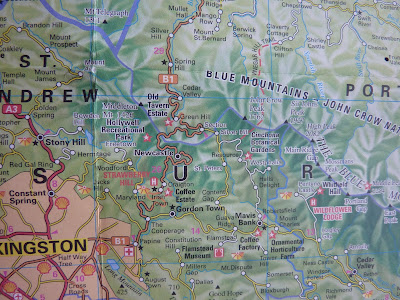 The Peace Corps Jamaica country director called me in early August to informed me that my safety and security had been compromised. While Negril is a wonderful spot with a relaxed atmosphere, sunny climate, and low crime rate there is an active sex tourism industry. Part of my work with NEPT involved implementing the Blue Flag Programme at the various resorts to try to encourage eco-tourism as an alternative to sex tourism. The typical sex tourist in Negril is a white woman who finds a dread-locked companion in a union commonly termed "rent-a-rasta." Sexual harassment is present all over the island and is something that you deal with whether you are American, Jamaican, male, or female. However, Negril's sex tourism industry naturally fosters harassment of white females in Negril. While I thought I was handling most situations fairly well, Peace Corps told me that I was no longer safe in Negril and that I had to move.
The Peace Corps Jamaica country director called me in early August to informed me that my safety and security had been compromised. While Negril is a wonderful spot with a relaxed atmosphere, sunny climate, and low crime rate there is an active sex tourism industry. Part of my work with NEPT involved implementing the Blue Flag Programme at the various resorts to try to encourage eco-tourism as an alternative to sex tourism. The typical sex tourist in Negril is a white woman who finds a dread-locked companion in a union commonly termed "rent-a-rasta." Sexual harassment is present all over the island and is something that you deal with whether you are American, Jamaican, male, or female. However, Negril's sex tourism industry naturally fosters harassment of white females in Negril. While I thought I was handling most situations fairly well, Peace Corps told me that I was no longer safe in Negril and that I had to move.Due to the situation, I was faced with an opportunity that most Peace Corps Volunteers never get to experience: choosing my own site. My ideal Peace Corps service would be in a small rural area with a strong sense of community. The people would be motivated and hard-working but might lack the formal education or resources required for self-advocacy. I took out my Jamaica road map, looking for towns that were located at the end of a road. I knew that a town at a road's end was sure to be rural. Generally, communities at the end of a road in Jamaica have very little crime because the way into the town is also the way out. I started reading newspaper articles, ministry reports, and lonely planet entries about all the towns I could find. In my search I came across Westphalia. Located in northeastern St. Andrew near Blue Mountain Peak, it has the highest elevation and lowest literacy rate in all of Jamaica. I paid a preliminary visit where I fell in love with the beautiful views and cool weather. I wanted to go there; but did they want me?
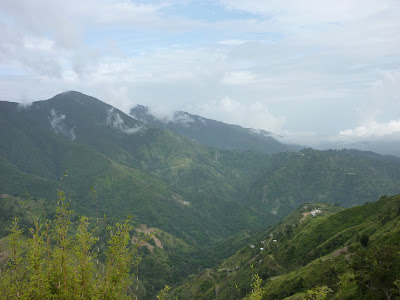 The highest settled local community in Jamaica, Westphalia is nestled under Cinchona Botanical Gardens and looks up at Blue Mountain Peak.
The highest settled local community in Jamaica, Westphalia is nestled under Cinchona Botanical Gardens and looks up at Blue Mountain Peak. Peace Corps called a community meeting to discuss what a Peace Corps Volunteer is, what she does, and to ask if the community would be interested. Though the meeting was held on a afternoon in the middle of the week when most of the community would be working at the farms, 45 people attended and unanimously agreed that they wanted me to live there. As an older Rastafarian farmer said "People better than money."
I moved there last Friday and stayed there over the weekend before having to leave for a Peace Corps conference on the north coast in Ocho Rios on Monday. The first two days at site were wonderful. I didn't get hit on once. The harmonies at church were IN TUNE. My host family is SUPER nice, and I already got an "I love you" hug. An I love you hug is the name I've given to when an older Jamaican woman wraps her arms around you and says "I love you." When kids at the soup kitchen want an I love you hug, they usually say, "hug me up." I'm living with a host family: Miss Bev, her two daughters who are my age, her 17 year old son, her last daughter who is 7 and her 4 grandchildren 3, 5, 5, and 7. My living conditions have gone from air conditioning, hot water, and a grocery store to a pit latrine, bucket baths, and no internet. I'm happy about living simply and falling asleep to donkeys braying instead of loud reggae music. I'm a little homesick for my friends in Negril and the sense of community I had there, but I'm sure it won't take long to get that in Westphalia....once I get back up there...
Jamaica has been in a tropical depression since Tuesday with heavy rains falling on much of the island. There have been flash floods, power outages, and landslides. The power in Westphalia has been gone since Wednesday. The hillsides are very steep and prone to landslides. The road to Westphalia has been blocked in several places, and the bridge over the Yallahs river, just past Mavis Bank is flooded. Luckily everyone in Westphalia community is safe and healthy. They are staying in their houses until the rains stop. There is another system reported to hit Jamaica next week. If it hasn't reached by Monday I think I will try to take the bus to Mavis Bank and walk from there. Most of the people in the area are subsistence farmers. No one will know what state the crops are in until the rain stops. I imagine there will be plenty of work to do by the time I get back!
Wednesday, September 22, 2010
Back to School!
A LOT has happened in the past three months and the St. Anthony soup kitchen looks very different today than it did in June. The most noticeable difference is the lack of children: almost all the children are attending school now!
During the past months of my service I met with as many organizations and people in Negril as I could: especially the service organizations. At the meetings I would explain who I am, what organizations I've been working with, and ask them to do the same. Invariably, the soup kitchen got a lot of attention. "What do you mean the children are NOT GOING to school?" All it took was mentioning the kitchen to the community and they were on board. What do you need? How can we help? How can we work together to get these children back into schol? NEET dropped off math and science text books, workbooks, and reading books the next day. The Negril Rotary Club donated tents, tables, and chairs so that the children would not have to fight over the limited chairs and space in the shade. A community artist gave a lesson in drawing. Even a tourist couple from Tennesse read about the soup kitchen online and brought down more school supplies that we ever dreamed we would have. Jeanne Fisher and Joan Cooney (rotarians and community members) started coming weekly to teach the children. Jeanne had taught for many years in Montego Bay and delivered excellent lessons in literacy, numeracy, and of course manners. The soup kitchen had transformed into the NYAM center (Negril Youth Activities and Mentoring center).
Throughout the summer we harped on the importance of going to school. Why don't you go? I don't have the shoes miss. No uniform miss. No birth papers miss. Community members have donated shoes, clothing, and old school uniforms. Joan Cooney even paid the fee for birth papers for one of the children: an eleven year old girl who doesn't know how to begin to form the letters to write her name because she has never been to school. She went to school for the first time on Monday complete with shoes and a uniform.
 Sandy and I work with the students while Brother Tom looks on.
Sandy and I work with the students while Brother Tom looks on.
Thursday, July 1, 2010
NYAM: The Soup Kitchen Children

I'm on my way to the soup kitchen, still about 20 yards away when I hear it "Teacher!" I look up to see about 20 smiling faces bobbing towards me. Shrieks of joy and I'm surrounded in a giant bear hug. Arms at all heights are grabbing my things. Let me tek yuh books, yuh bags, yuh bokkle. My heart melts as I smile back. Today is going to be tough.
A what dis word b-e-a-k? Sound it out. What sound does B make? Whoa, watch the shirt as a sticky three year old pulls his way up into my arms. Miss, miss! Look miss! Cyar, cat, rat, hat. I can get a sticker now miss? Whoops dodge the soccer ball flying at my head. Miss, I cyan ave a likke ice water? Styrofoam cup pieces fly from Kashwayne's mouth onto little Ricardo, the same three year old who was trying to scale my leg earlier. Here it comes: smack, smack. Blows fly back and forth. Theresa of course steps in to defend her brother and now three arms are flying. Some beaks are small. Some beaks are for p-p- Do you remember what we said about hitting? Use your words!
This is the parking lot of the the local soup kitchen. The children...well my neighbor Ms. Beulah calls them "street children." Sandy (a fellow PCV) and I call them the soup kitchen children. They aren't in school because they can't afford it. (School is free in Jamaica but you have to have shoes, a uniform, lunch money, taxi money...) Many of them come from troubled homes. There are more of them every day. They range from ages 2 to 16 and are at all different levels. They are the most challenging and most rewarding part of my day.
What am I doing there? Well, it started with Sandy and I trying to fill in for some of what they are missing by not going to school. We play math games, read stories, talk about science, make maps, and study calendars. We've also started treating some cuts and scrapes and Sandy even started treating their animals too! The children have been very responsive, asking for "school" on the days that the soup kitchen isn't open.
From surveying the community we realize that the ultimate goal of this project is to get the children back into school and we are simply filling a temporary gap and serving as mentors. In fact, that's what Sandy has named it: the Negril Youth Activities and Mentoring Center, or the NYAM center. Nyam is patois for eat, similar to the english expression "chow down."
I think about the students all the time, and have great dreams for the NYAM center. The vision is to introduce the students to community members (some of whom have already expressed interest) and facilities (we have trips to the fire department and health center lined up) so that they have positive role models in their life and that they can learn to take care of themselves using their community resources. A cross country team from the states came for a service trip. They had a really positive impact playing soccer with them, so a sports league might be a key element of the center as well. People are noticing the work that we do at the soup kitchen. I'm starting to get called "teach" on the streets even though most of my days are spent doing environmental work. When I was first assigned to Negril, Jamaica with the Peace Corps I was afraid there wouldn't be need. I'm realizing how unfounded my fears were. I'm happy to have found the soup kitchen children. Some mornings I'm tempted to yell "Students!" and run to them before they can get to me.
Friday, June 25, 2010
Dem Catch Dudus!
Sunday, June 20, 2010
Land Crabbing
On Friday night while leaving a reggae concert on beach road, I saw "wan 'ole 'eap a crab" scurrying up and down the shoulder. These aren't Maryland Blue crabs; they're LAND CRABS. With reggae beats still in my head I started planning an epic hunt. I started asking around about these dinosaurs, finding out everything I needed to know and gaining the advantage on my opponent. You don't catch these crabs with traps because they don't live in the sea. They live in holes on land. They're big. They're ugly. They're dirty, and they're smart. They come out of their holes at night to feed, but usually don't venture very far. As soon as they know you're coming they duck back down into their holes. Land crabs have keen hearing and eyesight so they are a challenege to sneak up on. The best time to catch them is after a heavy rain; their holes flood so all the land crabs come out to breathe.
It poured on Saturday night. Soooo...Sunday night was crab night! I called a fellow PCV, Bart to see if he wanted to come crab hunting. Apparently I had done my research well because his landlord Bigga and some other neighbors already had plans to look for crabs in the hills. I was welcome to tag along. We were dropped off by Patrick, a local taxi driver on a random residential street where Bigga had seen crabs before. We turned on our torches (or flashlights) and started sweeping the bushes for beady little land crab eyes. The suspense was quickly lost as we didn't see a singal crab on that street. "It's close to the end of the season" Bigga lamented. We had more luck on the golf course although the two crabs I managed to catch were "wash bawn" meaning they were female and pregnant. The crabs carry their eggs on the outside. Pregnant crabs act strangely. They either don't move at all or they go far from their holes very fast. They are often the ones that get run over by cars as they try to cross the street. They are also the easiest to catch. I was plesantly surprised that my crabbing companions didn't keep the wash bun crabs. Most people I've talked seem to focus more on the immediate rewards (one more fish in my pot) instead of preservation for the future (leave the fish to grow and reproduce).
Bigga and his friend Bobby seemed to have super human senses. They knew exactly where the crabs were and what they were thinking. They did most of the catching and in the end they had a bag full of about a dozen crabs. Beach road, I thought, tomorrow I'm trying my luck on beach road. I had watched the experts: step on the front of the crab so he can't get you, grab it by the back, then drop it in the bag.
It rained again on Monday afternoon and cleared up just before I left the office. Another perfect land crab night. Bart came over and we armed ourselves with his head lamp and a purple bucket with lid to carry the crabs. I changed into sneakers and we left the house just after dark.
As usual, we got a lot of attention as white people walking down the street. Especially white people walking with a purple bucket and headlamp. "What are you looking for, a taxi?" "No sir!" "Oh, you're looking for crabs" Our new machete-weilding friend in a white t-shirt full of holes made his way towards us. "Lend me your light" he said as he grabbed the head lamp from my hand. I feebly held onto the elastic "No man, we naa need yuh help. We want fi catch crabs ourselves." But my protests were to no avail. He had the light and was on a mission, stabbing crab holes (and sometimes crabs) with his machete. He wouldn't give back the light, so my only option was to follow and grab the crabs after he trapped them with his machete. The rain had brought the crabs out, and after only a few minutes, we had a full bucket. As we said goodbye, the man asked for J$200 as a "tip" for his help. "We never even wanted your help - you took our light!" We didn't have any money, so he insisted we give him the crabs because we "never would have caught them without him." He continued down the road swinging his bucket of crabs cursing loudly to himself "raas, bomba clot, $200"
Back to square one! With a slightly bitter feeling, and realizing we had just scared most of the crabs back into their holes, we set out looking again. Every few feet we were approached by people giving us recipes, wanting to help catch them, and asking lots of questions. Who are we? Where do we come from? Why are we doing something so "local?" We managed to catch two crabs, despite all the attention, and turned back towards home. "I want to catch one more crab on the way back." I said.
We reached the beginning of beach road, but the only crabs we saw were wash bawn. Through the trees I saw the sweep of flashlights. "How many yuh catch?" I shouted. The proud crabbers opened their bags to reveal about 8 BIG crabs. "Do you want one?" They fished out the biggest one and dropped him into our bucket. "Good luck!" I was satisfied: I had found my third crab on the way home after all.
That night I hardly slept at all. I kept waking up thinking that the crabs had knocked the bucket over and were running loose in my apartment. Around 2 in the morning they starting scratching around at the bucket. After an hour or so I got so frustrated I put them outside. Who cares if Lucky finds them: I need to sleep. I woke again at 5AM to Lucky barking. Oh no! The crabs! I run outside to see Sandy's face pressed against her screen. The bucket is still standing but Lucky has discovered it. He sniffs at the bucket, but when the crabs start to move he runs away barking. When he almost knocks the bucket over I decide they need to come back inside.
I told the women at the soup kitchen my crabbing adventure and asked them how to cook the crab. Most people either boil them with salt and scotch bonnet or they pick out all the meat and curry them. I didn't have any curry powder and I don't like cleaning crabs while I eat them. So, I decided to cook them like my grandmother cooks Maryland blue crabs: clean them, then sautee them with onions, white wine, and lots of old bay. Two problems: 1) There is no old bay in Jamaica and 2) There was no visible way to pry off the backs like there is with Maryland crabs. The first problem was easily fixed by substituting jerk seasoning (while a little sweeter they smell remarkably similar). I fixed the second problem by boiling the crabs first with the salt and pepper like the soup kitchen ladies prescribed. They were fighters: I had to use my machete to get them into the pot.
As they boiled a greenish brown scum accumulated on the surface of the water. That can't be healthy. I made sure to scrub all the crabs really well after boiling them to get off the dirt that had accumulated over their lives: again something I hadn't encountered with ocean crabs.
When they were nice and clean, I cooked them so my family would be proud. They tasted good, but the meat wasn't quite as sweet as the crabs back home. Afterwards, I felt vaguely sick to my stomach. I couldn't tell if I was actually sick or if that was just the feeling that comes from catching strange creatures in a strange land and cooking them yourself. Sandy's sons caught crabs when she lived in the Virgin Islands. She said they kept them for about two weeks feeding them cornmeal to clean their system and coconut to sweeten the meat. Next time, I might try that although I don't know if I would want to keep the beasts for two weeks. All in all it was another great adventure.
Saturday, June 5, 2010
Mi Yard
Mi yard is small and quiet but filled with life. There are four housing units. Three of them house Peace Corps volunteers (me, Curt a second year volunteer who leaves in July, and Sandy a third year volunteer and my mentor at NEPT who will be leaving in September). Miss Beulah and her daughter Maureen live in the fourth unit. Miss Beulah runs a shop in the front of the yard next to the street where all the children stop on their way to and from school to buy suck-sucks (bags of frozen juice), sweeties, and other snacks. I found out that suck-sucks are called serve-me-longs if they are frozen because "dem serve yuh long time." Maureen runs a school supply shop right next door. She sells pens, pencils, erasers, and all sorts of paper and notebooks but I've only ever seen students buy marbles and stickers.
My house is all the way at the back. It has three rooms (kitchen, bathroom, and bedroom) and hot water and air conditioning, neither of which I use. I've been living here for two weeks and neither the electricity nor the water have not shut off yet. All in all it is a very nice set up for a Peace Corps volunteer.
Our yard has a dog, Lucky, who Sandy found on her way to the Royal Palm Reserve (run by NEPT). Sandy thought he was black at first because he was so covered in fleas. She took him in and has taken great care of him. He is very Lucky that she found him. The yard also has two cats, three mango trees, wild basil, and a breadfruit tree. I'm hoping to add to the garden as soon as my compost matures. I bought a machete the other day, which is the tool of choice in Jamaica (pronounced Ma-shet: no e on the end). Need to cut a small tree? Don't use a saw: here's the machete. Need to dig a small hole? Don't use a trowel, the machete is right here. The jellyman uses a machete to chop open coconut. The cane man uses one to peel sugar cane. I'm a little embarassed to use my machete because its so clean. The wood on most Jamaicans' machetes is dark and smooth from use and the blade has been filed many times.
There are many different types of mangoes on the island and they all have several names. Our yard has small blackey mangoes (so called because of the black spots, also called green gage or gatey), east indian mangoes (my favorite), and a large mango that Maureen and Miss Bula call "the big ones." Its mango season now, so I've been enjoying all of them!
It's also land crab season. I visited Kool Runnings water park last weekend (Yes, I rode the Jamaican bobsled. Several times in fact) and there were about fifty of them swarming around the restrooms. One of the employees was dropping as many as she could into a bucket to take home and cook! I've been keeping my eyes out for them in the yard, but so far I've only seen them as road kill. There are several crab holes at the catholic church, so I might bring a bucket with me on Sunday.
Wednesday, May 26, 2010
War in Kingston
Disclaimer: What follows are not my personal views or the views of Peace Corps, only what I have heard and read from local sources.
It started last week when Prime Minister Golding announced that Justice Minister Dorothy Lightbourne would sign the authorization for the extradition of Christopher Dudas Coke to the United States. The U.S. government requested the extradition of Dudas last August for drug and gun running charges. Dudas is based out of Tivoli Gardens in west Kingston. Last Friday, newspaper pictures showed that the neighborhood had been barricaded and was being patroled, presumably by local gang members. On Saturday what most Jamaicans have been referring to as "the war" began. Three police stations were attacked, one set on fire, and two fired at. The Prime Minister declared a state of emergency for the Kingston and St. Andrew parishes on Sunday which can be used as a rationale for suspending civil liberties and will last for a month unless police deem it safe to cease or parliment deems it necessary to continue. Unfortunately, many civilians did not leave before the violence started and are caught in the crossfire.
Both the police and the military are working hard to restore order to the region and to capture Coke. I was only able to talk very briefly with my host mom from Hellshire who works with the police in Kingston to assure that she was alright. Most of the violence has been concentrated in Kingston, but some has occured in the parish of St. Catherine as well. In fact, on Monday the flat bridge in Bog Walk, very close and en route to Ewarton (my old home) was barricaded. Fortunately, my host mom in Ewarton returned from her conference late enough in the afternoon that the blockade had been dismantled.
Saturday, May 22, 2010
It's Official!
Yesterday Peace Corps Group 81 graduated from training and became real volunteers! The ceremony took place at the U.S. embassy and was overseen by the chargé d'affaires because an ambassador is not currently assigned to Jamaica. We were featured in an article in today's Observer (the main newspaper in Jamaica). After two months of training and looking forward to finally being a PCV instead of a PCT, the actual swear in ceremony was a little anticlimactic. I returned to my site last night and I'm ready to get started!
Sunday, May 9, 2010
The English House
This past Wednesday several Peace Corps trainees went to Patrick's host family's (the English's) farm to learn about raising chickens: specifically how to slaughter them. I was really excited to have this opportunity because I think that if you're going to eat meat you should be comfortable with killing the animals yourself. Three little girls (Patrick's host sisters) ran out to meet us followed cooly by Patrick who led us behind the house.

We stopped on the way to see the English family's dog and her litter of five puppies. They still had their eyes closed and their little limbs were only barely able to help them balance as they wriggled around on their tummies.
We continued back to where Ricky had brought out the first three chickens, handing one of them to me to hold. The English family gets around 30 new chicks every 4 weeks. After eight weeks they're ready to eat. The first chicken was totally unsuspecting as Ricky adeptly folded its wings behind it into the bag, bent its neck over the edge and sliced the head off. I jumped a little as the bird's body started flapping around, turning the bag crimson. That's all there is to it. Patrick was next, followed by Sammi. 3, 4, 5 chicken heads lay on the ground blinking at their spastic bodies. The chicken I was holding seemed to cluck more frantically with each new head. I'll wait for the next round to try.
 After the chickens were killed we dipped the bodies in boiling water t make it easier to remove the feathers. Once the feathers are plucked and the skin on the feet removed, the chicken is washed and ready to be cleaned. Grandma showed me how to cut the bottom of the chicken, which organs to save (the liver, the heart, and the gizzard), and which parts of the feet are good for chicken foot soup. Now all I had to do is kill one and then I would know the process from start to finish.
After the chickens were killed we dipped the bodies in boiling water t make it easier to remove the feathers. Once the feathers are plucked and the skin on the feet removed, the chicken is washed and ready to be cleaned. Grandma showed me how to cut the bottom of the chicken, which organs to save (the liver, the heart, and the gizzard), and which parts of the feet are good for chicken foot soup. Now all I had to do is kill one and then I would know the process from start to finish.
Sammi and I followed Ricky to the side of the house where we each grabbed a chicken by the wings. Sammi brought her chicken to the bag after Ricky. I turned my chicken the other way, telling her she didn't have to watch. I could feel the chicken's pulse speeding up and my pulse speeding up to match it. The largest thing I had killed before this was a butterfly, and that was an accident. I don't know if the chicken had stolen a glance at its sisters or if it was picking up on my nervousness but this chicken was squawking worse than the last one. Ricky helped me tuck her into the bag and her eyes closed as if in resignation. I felt pressure on the knife, and then a wave of emotion washed over me. I started to cry. I couldn't really say what the emotion was. I think it deserves its own name, but it was probably closest to gratitude and a deep appreciation for life. It suddenly made sense to me why some Native Americans thanked the animal's spirit after killing it. The juxtaposition of the newborn puppies in the front of the house and the chickens in the back probably contributed as well. As I walked home I thought about how much better it was that these chickens could be killed and prepared with care rather than the metallic clutches of a machine. It is so valuable to realize that the food which sustains your life was at one point alive itself.

Thursday, April 29, 2010
Fruit Walk
 Today, as I walked home from Polyground Primary School, I met two little boys who gave me a tour of all the trees in the neighborhood. One of the many wonderful things about Jamaica is that most trees here bear edible fruits. The biggest of them all is the Jackfruit which is about the size of a watermellon but grows from thick stems right out of the trunk of the tree. The inside of a jackfruit is rows of flower-like fruit whichs tastes like a sweeter version of cantelope and smells like a combination of gym sock and flowers.
Today, as I walked home from Polyground Primary School, I met two little boys who gave me a tour of all the trees in the neighborhood. One of the many wonderful things about Jamaica is that most trees here bear edible fruits. The biggest of them all is the Jackfruit which is about the size of a watermellon but grows from thick stems right out of the trunk of the tree. The inside of a jackfruit is rows of flower-like fruit whichs tastes like a sweeter version of cantelope and smells like a combination of gym sock and flowers. Pawpaw (or papaya) also grows straight out of the tree trunk. It has a distinctive taste that you either love or hate. I can only eat it dried. Behind this Pawpaw tree shade cloth is spread overhead of some plants. Greenhouses in Jamaica are designed to keep the sun and heavy rains off the plants and usually employ shade cloth.
Pawpaw (or papaya) also grows straight out of the tree trunk. It has a distinctive taste that you either love or hate. I can only eat it dried. Behind this Pawpaw tree shade cloth is spread overhead of some plants. Greenhouses in Jamaica are designed to keep the sun and heavy rains off the plants and usually employ shade cloth.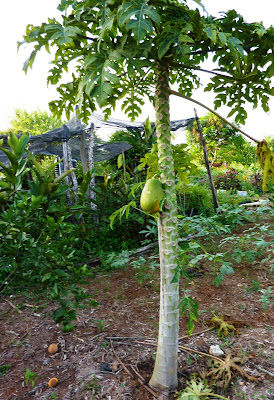 This is a cashew tree. As the boys tried to point out what a cashew pod looked like the neighbor's dog jumped at the fence and sent them running back down the hill.
This is a cashew tree. As the boys tried to point out what a cashew pod looked like the neighbor's dog jumped at the fence and sent them running back down the hill. Breadfruit is a common breakfast food in Jamaica. The most common way of cooking it is to cut an x in the bottom and roasting it over an open flame. A Jamaican might be called a roast breadfruit which is black on the outside but white on the inside.
Breadfruit is a common breakfast food in Jamaica. The most common way of cooking it is to cut an x in the bottom and roasting it over an open flame. A Jamaican might be called a roast breadfruit which is black on the outside but white on the inside. The boy on the left climbed this apple tree and picked me the sweetest, juiciest Otaheite apple I've had yet.
The boy on the left climbed this apple tree and picked me the sweetest, juiciest Otaheite apple I've had yet.
 This is what Ackee looks like growing on the tree (from the Jamaican national dish ackee and saltfish). Ackee is by far the most common tree in Ewarton. The second most common trees are orange trees. Lorna usually squeezes a gallon of orange juice a week from the trees in our backyard.
This is what Ackee looks like growing on the tree (from the Jamaican national dish ackee and saltfish). Ackee is by far the most common tree in Ewarton. The second most common trees are orange trees. Lorna usually squeezes a gallon of orange juice a week from the trees in our backyard.
My favorite Jamaican fruit is mango. Zoom in on the picture to see if you can find them!

Another very common tree is the coconut or jelly tree. One of the little boys informed me that when they're whole you call them jelly and that the insides are called coconut. One of the best ways to rehydrate on a hot day is to buy a frozen jelly from the jelly man and to drink the coconut water.

They showed me a grapefruit tree, a tamarind tree, an almond tree, and a cherry tree. The cherry tree was laden with red cherries but I couldn't see them until I got within five feet of them. They also pointed out the green banana tree. While they look like smaller versions of the yellow bananas we see in the grocery store, these bananas will never ripen. Instead, they are peeled (make sure to coat your hands in oil or they will stain you) and served boiled.
 I had a fun walk home and learned much more than I would have without my new friends!
I had a fun walk home and learned much more than I would have without my new friends!

























 Banker to the Poor
Banker to the Poor A Walk Across America
A Walk Across America Catch 22
Catch 22 Dreams from My Father
Dreams from My Father Against the Grain: How Agriculture has Hijacked Civilization
Against the Grain: How Agriculture has Hijacked Civilization Born to Run
Born to Run Deep Economy
Deep Economy A Long Trek Home
A Long Trek Home Lord of the Rings: Return of the King
Lord of the Rings: Return of the King Black Like Me
Black Like Me Guns, Germs, and Steel
Guns, Germs, and Steel White Teeth
White Teeth Water for Elephants
Water for Elephants Lord of the Rings: The Two Towers
Lord of the Rings: The Two Towers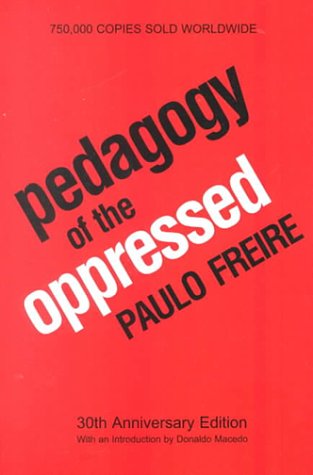 Pedagogy of the Oppressed
Pedagogy of the Oppressed A Walk in the Woods
A Walk in the Woods A Separate Peace
A Separate Peace Seize the Day
Seize the Day The Ugly American
The Ugly American The Amazing Adventures of Kavalier & Clay
The Amazing Adventures of Kavalier & Clay Going Home to Teach
Going Home to Teach 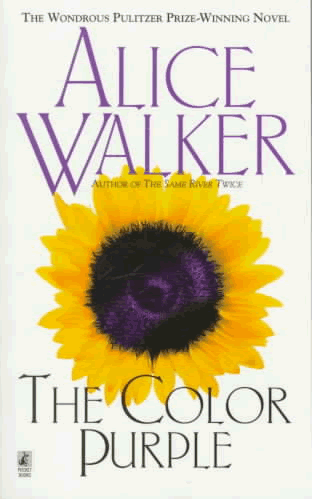 The Color Purple
The Color Purple  The Dead Yard: Tales of Modern Jamaica
The Dead Yard: Tales of Modern Jamaica  Brief Interviews with Hideous Men
Brief Interviews with Hideous Men  Zen and the Art of Motorcycle Maintenance
Zen and the Art of Motorcycle Maintenance  East of Eden
East of Eden  Walden
Walden  The Omnivore's Dilemma
The Omnivore's Dilemma  Earth's Climate: Past and Future
Earth's Climate: Past and Future  You Can Farm: The Entrepreneur's Guide to Start and Succeed in a Farming Enterprise
You Can Farm: The Entrepreneur's Guide to Start and Succeed in a Farming Enterprise